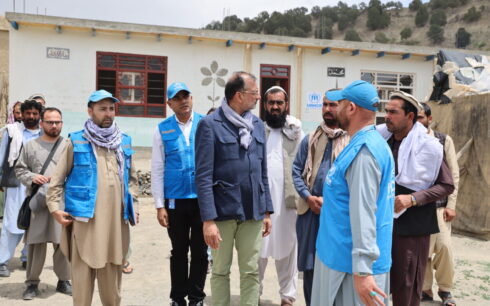KABUL — Even as the Taliban-led Ministry of Education slashes its workforce under the banner of administrative reform and budget shortfalls, it continues to channel public funds into building religious schools aligned with its ideology, according to official figures and public statements.
Over the past month alone, the ministry has either inaugurated or launched the construction of nine madrassas in five provinces — Kabul, Ghazni, Paktia, Kandahar, and Faryab — with a combined budget exceeding 50 million afghanis (approximately $700,000). These projects have been publicly framed as part of the Taliban’s broader plan to reshape the country’s education system around religious instruction.
In the latest example, acting Education Minister Habibullah Agha laid the foundation stone for two new madrassas in the northern province of Faryab during an official visit earlier this week. The ministry said the projects, worth 11 million afghanis, are being funded directly from the national education budget.
“Alongside general school development, the ministry has begun work on two religious schools valued at 11 million afghanis,” ministry spokesman Mansoor Ahmad Hamza said in a statement posted to social media. He also noted the community-funded construction of two mosques and educational annexes worth 130 million afghanis.
While the Taliban says these efforts reflect its commitment to “Islamic values,” critics argue the strategy is contributing to the erosion of secular and inclusive education, while deepening long-term risks to social stability.
“These madrassas, as they are being designed and operated, foster extremist thinking and lack the curriculum needed to prepare students for economic participation or civil engagement,” said Abdul Ahad Farzam, an education researcher based in Kabul. “They are becoming incubators for future instability.”
The religious school construction comes as the Taliban prepares to eliminate nearly 90,000 positions from the Ministry of Education under a restructuring plan known as “organizational balancing.” The ministry has justified the layoffs — which are already affecting hundreds of teachers — as a necessary response to what it calls “inflated staffing” and fiscal constraints.
This contradiction — expanding madrassas while curtailing employment in the formal education sector — has drawn sharp criticism from education advocates and international observers. The United Nations and human rights organizations have repeatedly warned that the Taliban’s restrictions on girls’ education and the politicization of schooling are driving the country’s education system into deeper crisis.
The Ministry of Education under the Taliban has been under scrutiny for prioritizing religious indoctrination over inclusive, skills-based learning. Observers say this approach threatens to sideline generations of Afghan students, particularly girls, and accelerate the country’s isolation from global educational standards.





